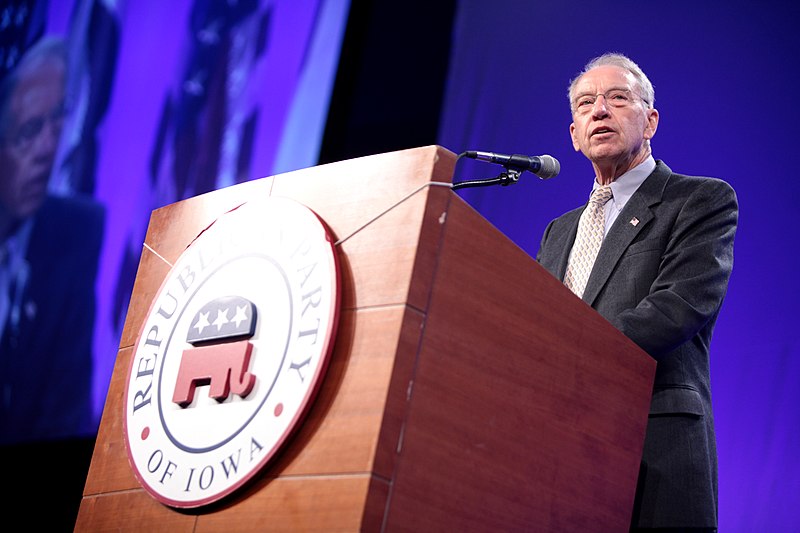Scandal has inundated the news cycle for the past year, and Iowa has not been able to completely steer clear of the political tide. Despite being considered — by at least themselves — to be the polite, ‘ope’-ing heartland of the Midwest, Iowans have experienced its fair share of controversy in recent memory, calling into question the legitimacy of the original notion of Iowans.
Most recently, Republican Senator Chuck Grassley gave an interview with the Des Moines Register concerning the newest amendments to estate tax, which would, under the new tax plan, apply to even fewer people. In it, he defended the amendment, saying that the people who would have the estate tax are more responsible with their money than poorer people.
“I think not having the estate tax recognizes the people that are investing as opposed to those that are just spending every darn penny they have, whether it’s on booze or women or movies,” Grassley told The Register.
This comment made national news as hundreds grew irate at his insinuation that the middle and lower classes frivolously spend their money while the “rich” deserve tax breaks. For many, this news contrasted the perceived impression of Grassley — and Iowans — as innocuous Midwesterners. Grassley, before known nationally for his feud with the History Channel, serves as a reminder that Iowa may not be as harmless as people thought.
The Midwest prides itself on being different from either of the coasts. We’re nicer, more thoughtful, less aggressive. While maybe just a coping method for living in the middle of corn, we’ve clung to this idea for generations. But, if the values we wish to embody fail to be projected by the people who lead us, how realistic can these ideals be as descriptors for Iowans?
The Iowan leadership is no different from the rest of the country in terms of quality of character. Perceived superiority is at best misguided because our politicians are, at the end of the day, the same as everywhere else.
For example, Grassley’s coworker, Senator Joni Ernst, has long been the center of small scandals. Ranging from her comments against a federal minimum wage to her belief in the abolition of the Department of Education, Ernst has made a name for herself — but certainly not a favorable one. Her attempts to appeal to blue-collar Iowa led to an off-color, tragically hick ad in which she bragged about her ability to castrate pigs before then moving on to telling America that “when I get to Washington, I’ll know how to cut pork. Washington is full of big spenders. Let’s make ‘em squeal.”
Not only did this look poorly on Ernst — the pig castrator up against Washington hotshots — but Iowa fared poorly in the news. For a state that’s already confused for Idaho when out-of-staters are asked to pinpoint it on a map, Iowa really can’t bear to lose much of its street cred to a two-bit politician from Red Oak, Iowa.
Ernst would be known for comedic hijinks on par with Sarah Palin, but sadly, she doesn’t even matter enough to get SNL airtime. Ever since the election, she has gotten little to no airtime in any meaningful way. Her policies are more ineffectual than anything; a Google search offers up nothing to her name beyond Iowan tribune articles.
Beyond partisan politics, the problem with people like Ernst is not their politics, with which I may or may not agree. It is that her capabilities to lead the state and put forth important legislature are severely diminished. She is not considered to be a political force, but rather a figurehead for what is wrong with politics. She is inefficient, to say the least.
Similarly, the sexual harassment scandals have not overshot Iowa, either. In November, the state finally agreed to pay $1.7 million to a former staffer, Kirsten Anderson, to settle sexual harassment lawsuit. The details of the case have not been released as they are private “personnel issues.” Anderson was fired in 2013, mere hours after complaining about sexual harassment at the office — an issue many saw as the incompetence of the Senate to properly deal with workplace harassment issues.
Bill Dix, Iowa Senate majority leader, was caught in the controversy after his inability to close the case and institute concrete policies to avoid sexual harassment later.
“We’re trying really hard to do this right,” Dix said concerning his and his office’s inaction. But, despite their purported efforts, this is still an open issue.
While these are only three examples of the flaws of Iowa political leadership, they are an important reminder that we are not perfect. There are flaws in the system, and sugarcoating it or ignoring it in favor for a prettier notion of what “Iowa” entails does not do anyone any favors. However, these flaws in leadership are not a reason to abandon the idea of Midwestern values — but rather one that proves why we need to value honesty, neighborliness and excellence to make Iowa a state that matters beyond its caucus role every four years.













